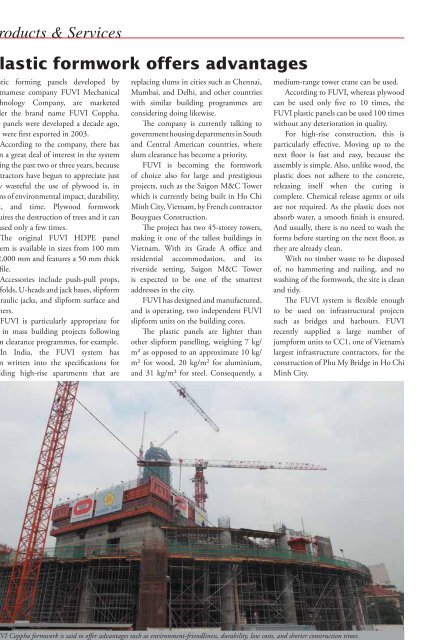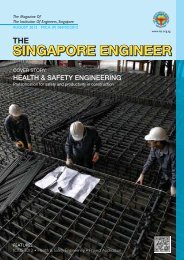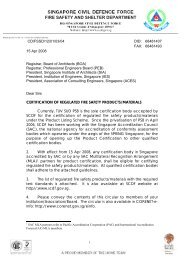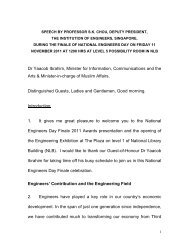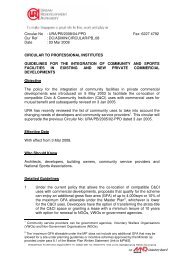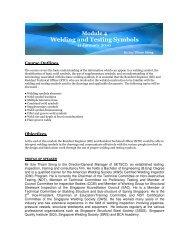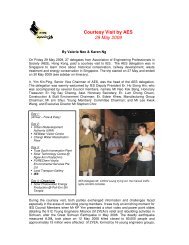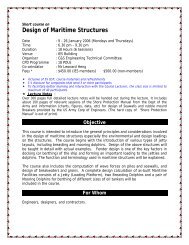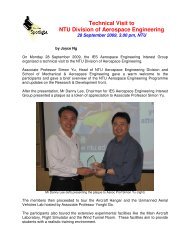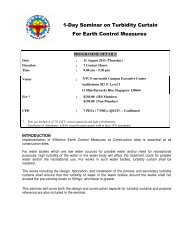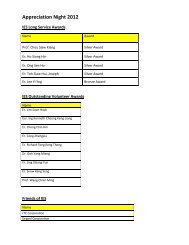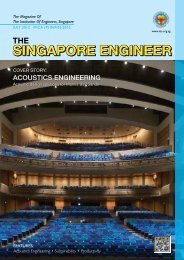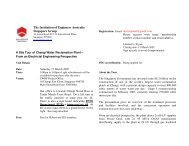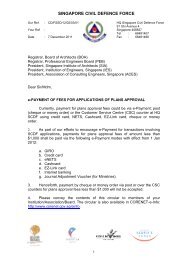News & Events - Institution of Engineers Singapore
News & Events - Institution of Engineers Singapore
News & Events - Institution of Engineers Singapore
You also want an ePaper? Increase the reach of your titles
YUMPU automatically turns print PDFs into web optimized ePapers that Google loves.
Products & Services<br />
Plastic formwork <strong>of</strong>fers advantages<br />
Plastic forming panels developed by<br />
Vietnamese company FUVI Mechanical<br />
Technology Company, are marketed<br />
under the brand name FUVI Coppha.<br />
The panels were developed a decade ago,<br />
and were first exported in 2003.<br />
According to the company, there has<br />
been a great deal <strong>of</strong> interest in the system<br />
during the past two or three years, because<br />
contractors have begun to appreciate just<br />
how wasteful the use <strong>of</strong> plywood is, in<br />
terms <strong>of</strong> environmental impact, durability,<br />
cost, and time. Plywood formwork<br />
requires the destruction <strong>of</strong> trees and it can<br />
be used only a few times.<br />
The original FUVI HDPE panel<br />
system is available in sizes from 100 mm<br />
to 2,000 mm and features a 50 mm thick<br />
pr<strong>of</strong>ile.<br />
Accessories include push-pull props,<br />
scaffolds, U-heads and jack bases, slipform<br />
hydraulic jacks, and slipform surface and<br />
corners.<br />
FUVI is particularly appropriate for<br />
use in mass building projects following<br />
slum clearance programmes, for example.<br />
In India, the FUVI system has<br />
been written into the specifications for<br />
building high-rise apartments that are<br />
replacing slums in cities such as Chennai,<br />
Mumbai, and Delhi, and other countries<br />
with similar building programmes are<br />
considering doing likewise.<br />
The company is currently talking to<br />
government housing departments in South<br />
and Central American countries, where<br />
slum clearance has become a priority.<br />
FUVI is becoming the formwork<br />
<strong>of</strong> choice also for large and prestigious<br />
projects, such as the Saigon M&C Tower<br />
which is currently being built in Ho Chi<br />
Minh City, Vietnam, by French contractor<br />
Bouygues Construction.<br />
The project has two 45-storey towers,<br />
making it one <strong>of</strong> the tallest buildings in<br />
Vietnam. With its Grade A <strong>of</strong>fice and<br />
residential accommodation, and its<br />
riverside setting, Saigon M&C Tower<br />
is expected to be one <strong>of</strong> the smartest<br />
addresses in the city.<br />
FUVI has designed and manufactured,<br />
and is operating, two independent FUVI<br />
slipform units on the building cores.<br />
The plastic panels are lighter than<br />
other slipform panelling, weighing 7 kg/<br />
m² as opposed to an approximate 10 kg/<br />
m² for wood, 20 kg/m² for aluminium,<br />
and 31 kg/m² for steel. Consequently, a<br />
medium-range tower crane can be used.<br />
According to FUVI, whereas plywood<br />
can be used only five to 10 times, the<br />
FUVI plastic panels can be used 100 times<br />
without any deterioration in quality.<br />
For high-rise construction, this is<br />
particularly effective. Moving up to the<br />
next floor is fast and easy, because the<br />
assembly is simple. Also, unlike wood, the<br />
plastic does not adhere to the concrete,<br />
releasing itself when the curing is<br />
complete. Chemical release agents or oils<br />
are not required. As the plastic does not<br />
absorb water, a smooth finish is ensured.<br />
And usually, there is no need to wash the<br />
forms before starting on the next floor, as<br />
they are already clean.<br />
With no timber waste to be disposed<br />
<strong>of</strong>, no hammering and nailing, and no<br />
washing <strong>of</strong> the formwork, the site is clean<br />
and tidy.<br />
The FUVI system is flexible enough<br />
to be used on infrastructural projects<br />
such as bridges and harbours. FUVI<br />
recently supplied a large number <strong>of</strong><br />
jumpform units to CC1, one <strong>of</strong> Vietnam’s<br />
largest infrastructure contractors, for the<br />
construction <strong>of</strong> Phu My Bridge in Ho Chi<br />
Minh City.<br />
FUVI Coppha formwork is said to <strong>of</strong>fer advantages such as environment-friendliness, durability, low costs, and shorter construction times.<br />
34 · THE SINGAPORE ENGINEER Jun 2010


